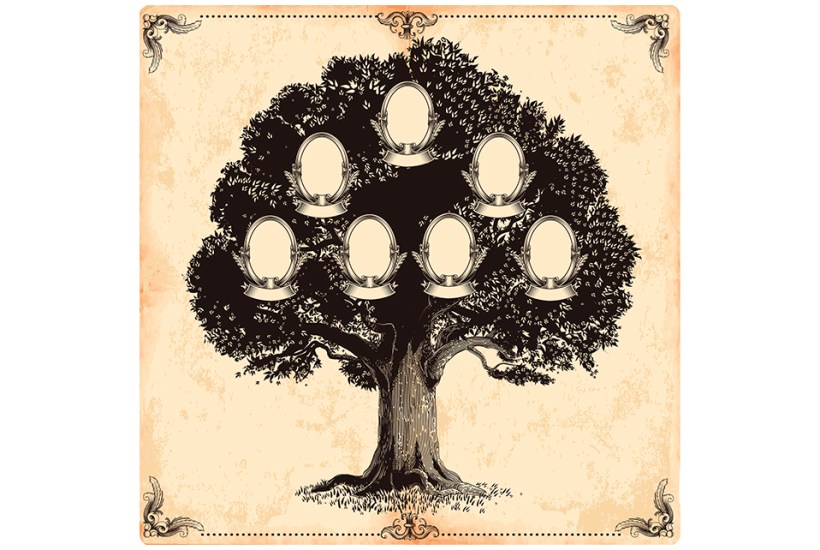Recent births and deaths in my family have got me thinking about the family tree. A few years ago, we pieced together a remarkably discernible lineage that goes right back to William the Conqueror, or at least his alleged Anglo-Saxon concubine, and various Norman knights who used to own much of England. And it is this lineage that has made me realise: the hideous underprivilege and mistreatment of my ancestors entitles me to reparations.
The story begins with that Anglo-Saxon woman Maud Ingelric. Many historians believe she was the mistress of William the Conqueror, and bore him a favoured son, William Peverel the Elder, my great-great-g-g-g-g-g-g-g-g-(etc)-grandfather. Maud herself was of ‘noble English descent’, an alleged granddaughter of King Aethelred the Unready and the daughter of ‘the Saxon Ingelric, Keeper of the Sacred Grail’. Maud now lies in the chancel of the monastery she founded in Hatfield Peverel, Essex.
If William Peverel the Elder was not the bastard son of William the Bastard, he was the son of Norman Knight Ranulph Peverel, but as the Peverels are likely descended from Welsh kings, various Viking earls of the Orkneys and possibly the Nordic God of Snow and Ice (this last is disputed by pedants), it is clear that, either way, I am the direct if distant progeny of seriously posh dudes.
Trouble is, it all went downhill from there. For a couple of centuries the Peverels peacefully taxed and brutalised their English serfs, but then they chose the wrong side in the odd war, various castles got taken away, and ‘my side’ of the family moved west, marrying into the lordly Tremaynes of St Martin-in-Meneage, west Cornwall. The Tremaynes were not royal favourites but they were still doing OK – to this day there is an exquisite Tremayne Manor by Frenchman’s Creek, Helford (a Regency job now, as the original medieval seat got torched).
From this lovely spot, unfortunately, things spiralled further down. One Tremayne took the wrong side of the Cornish Rebellion in 1497, and bang went the beautiful manor. The Tremaynes fatefully divided again: my side began marrying into minor and quite drunken gentry and living in rather small manorial farmhouses in the Lizard or Penwith, though they did own the odd tin mine and smelting house. From there it all gets even more depressing, as the mine-owning gentry kept having too many kids, and small estates were divided ever further, until the sons are described as mere yeoman farmers, or even – shudder – ‘apprentices’.
A generation later, the dreaded word ‘tinner’ – an actual tin miner – appears in the parish records, describing one of my ancestors. These tinners were toiling in the mines once owned by their great-great-great-grandparents. They would surely not have known. Did they even care? Probably not, as the social slide continued, and as the farmers, labourers and tinners kept sprogging even more kids, including one daughter, Frances Tremayne, who married John Moyle in 1752. John Moyle was also probably a tin miner.
By the late 18th, 19th century we were in truly dire straits. John Moyle’s son Peter married Mary Hill, and from the off they were living in serious penury, which wasn’t helped by their having another ten kids.
One of these was Peter Moyle, my great-great-great-grandfather; in 1830 he married Elizabeth Perry, and they had, yes, ten kids – and they were living in some of the worst poverty ever seen in Britain. In the census of 1851, it is recorded that of the ten children, Elizabeth (aged 18) is a labourer, Peter (15) is a tin miner, William (13) is a tin miner and Stephen (ten) is a tin miner. Only the under-tens are spared the quasi-child slavery of crawling naked for hours down the tunnels of undersea Botallack, in constant danger of drowning or rockfall, barely seeing the sun from one winter to the next, and probably dying of silicosis or arsenic poisoning in their mid-twenties as a reward. One record for west Cornwall at this time puts the life expectancy of tin miners at 23.
Nor did this serfdom bring them any material comfort. By the next census the family is even more impoverished, despite throwing all of its children down the mines: they are recorded as needing ‘village alms’ to prevent starvation.
It is for these people that I make my demands. Where, for instance, is the ‘white privilege’ of little Stephen Moyle, forced down a tin mine aged ten? The concept of white privilege applied to Stephen and his desperate siblings is beyond insulting. Moreover, why should his descendants be paying ‘reparations’ to anyone else? Was Stephen Moyle’s life demonstrably better than the rest of humanity’s?
And if we are talking reparations, then I’d quite like a word for my maternal grandmother, Annie Maud Jory. At the age of 11 she was packed off to the mines to be a ‘bal maiden’ – a young girl sent to break rocks, barefoot, in all weathers, with little hammers. This job was known for its desperate harshness. The sound of the ‘stamps’ – the ore-breaking machines – was so loud it sent many of the bal maidens deaf, and they had to develop their own sign language. If anyone deserves reparations we could start with my very own grandmother, a forced child labourer, whose grandson – me – would rather like a belated slice of the profits made by her hideous child slavery in those lucrative mines.
I am, of course, joking. I do not believe in the concept of generational reparations, no more than I really believe in the concept of white privilege. By definition, as humans of any race, creed or colour, we are all descended from kings and warlords, just as, by definition, we are all descended from serfs, peasants and slaves.
Let us, as they say, draw a line. We could get my grandfather Harold Thomas to do it. He was by all accounts an excellent carpenter – and probably the first of my family to escape the tin mines for 100 years, about 900 years after his granddad William the Conqueror came over the Channel.
Got something to add? Join the discussion and comment below.
Get 10 issues for just $10
Subscribe to The Spectator Australia today for the next 10 magazine issues, plus full online access, for just $10.
You might disagree with half of it, but you’ll enjoy reading all of it. Try your first month for free, then just $2 a week for the remainder of your first year.














Comments
Don't miss out
Join the conversation with other Spectator Australia readers. Subscribe to leave a comment.
SUBSCRIBEAlready a subscriber? Log in